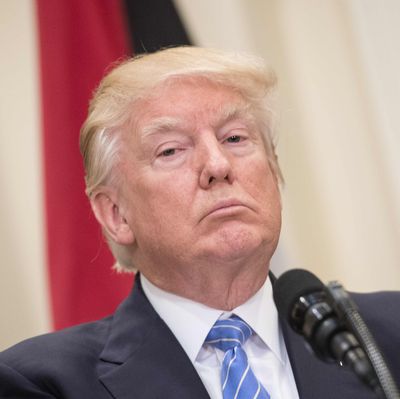
It seemed for a while that, while Donald Trump’s presidency has proven less competent and more right-wing than expected, it has also defied the fears of authoritarianism that circulated after the election. But the importance of the two newest revelations from the Comey episode change that fundamentally.
First, Trump boasts to NBC’s Lester Holt not only that he decided to fire Comey himself, regardless of the advice from the Department of Justice, but that he did it specifically to strike back at the FBI’s Russia investigation. (“When I decided to [fire Comey], I said to myself, you know, this Russia thing with Trump and Russia is a made-up story,” Trump said.) Reports from numerous media organizations have confirmed the centrality of the Russia investigation in Comey’s firing. Now Trump is admitting it in public.
Second, the New York Times reports that Trump, in January, asked Comey to promise his loyalty. (Comey said he could only offer “honesty.”) Two Comey friends heard this account at the time, and have felt free to share it since. This is not only wildly improper, it is a window into Trump’s disregard for basic democratic norms surrounding law enforcement. If the FBI is operating out of loyalty to the president, then one of the most important barriers between a democratic government and an authoritarian one has fallen.
Donald Trump’s most consistent belief — even more consistent than his skepticism of international trade, which has waned on occasion — is his worship of power. He is not merely willing to do business with despots, as most presidents have been. He admires them because of, not despite, their despotism. His repeated refusal during the campaign to accept the legitimacy of the election (“rigged”), his promises to jail his opponent, and his intermingling of state power and personal profit all suggested a threat to the health of the republic. Now that threat has arrived. And if Republicans in Congress continue to cover for his actions, the damage to the health of American government may be longstanding.






























